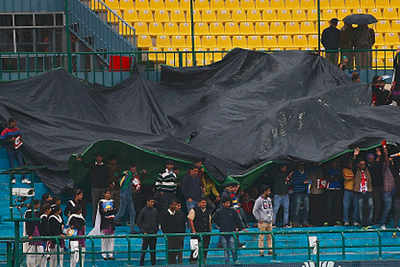- News
- Sports News
- Venues under pressure to deliver by BCCI
Trending
This story is from June 26, 2016
Venues under pressure to deliver by BCCI
From this season, though, things might finally change for the better. You may be able to buy a ticket of a match of your choice well in advance, and may not encounter a filthy toilet inside the stadium.

(Getty Images)
Key Highlights
- For the first time, you may see advertisements ushering in Indian cricket's home season
- BCCI announced that it will enter into 'venue agreements' with the associations hosting international matches
- BCCI is promising a better 'fan experience'
MUMBAI: In the hype of the announcement of the 'Mini-IPL' recently, a key piece of information which went unnoticed was the Board of Control for Cricket in India (BCCI)'s genuine attempt to improve the experience of the Indian cricket fan, something which its new president Anurag Thakur had stressed on since he took charge.
While many new, impressive cricket stadiums have sprung up in India in recent years, little has changed for the spectator, who still has to endure shabby conditions once he/she enters the ground to watch a match.It can be safely said that the administrators have thus far taken the Indian cricket fan for granted. From this season, though, things might finally change for the better. You may be able to buy a ticket of a match of your choice well in advance, and may not encounter a filthy toilet inside the stadium. For the first time, you may see advertisements ushering in Indian cricket's home season, just like it happens in the IPL.
At its Working Committee meeting on Friday in Dharamsala, the BCCI announced that it will enter into 'venue agreements' with the associations hosting international matches in the coming season, which will see India host as many as 13 Tests, eight ODIs, and three Twenty20 Internationals. "The BCCI will define these state associations' roles and responsibilities and establishing the minimum standards required," said a release after the meeting.
As per this agreement, a state association will basically need to guarantee that it can provide decent facilities for hygiene (toilet facilities, food arrangements), ensure that the seats are numbered, the facilities for media are good, and provide a plan as to how it plans to market its match, in terms of advertising, putting out banners and creating awareness about the match in its own city, to selling tickets for it. "Basically, it is no longer your right to host a match. You've to earn that right," said an official. All the associations hosting Tests this season have already asked for a presentation about how they plan to go about hosting and marketing the game allotted to them.
Currently, some of the biggest cricket stadiums in India still lag behind in providing basic facilities to the media and spectators. According to sources, if they fail to match the above-mentioned criteria, they may end up losing the match allotted to them. To help these associations, the BCCI is ready to engage a few centrally-contracted agencies, who will look after the ticketing, hygiene standards and marketing of matches in India during the upcoming season. The money that the BCCI pays to these agencies will then be deducted from these associations' share of the grant which they get from the Board.
This 'venue agreement,' as BCCI president Anurag Thakur had said after the meeting, already exists in the IPL, in a tripartite form, between the "franchise, the BCCI and the state associations." "In the upcoming international matches to be hosted in India, BCCI will enter into an agreement with the host association to fulfill our commitment of 10% tickets to the students and specially-abled during the Tests," Thakur had said.
"The BCCI will put a plan in place to market the upcoming season, so that the fans are aware about when which match will be played, on which date, and at which venue. More marketing will take place in the 'host city' of that match, so that in the rural areas, each category of the fan get a lot of awareness about the match being held in their city," he had stressed.
Thakur had revealed that India were set to play at least 20 Tests at home in the next eight-year FTP cycle, which starts from 2019, "so that revenues of the board and the state associations are secured." "The Indian fan deserves a defined cricket season, which is from October to March," he had concluded.
While many new, impressive cricket stadiums have sprung up in India in recent years, little has changed for the spectator, who still has to endure shabby conditions once he/she enters the ground to watch a match.It can be safely said that the administrators have thus far taken the Indian cricket fan for granted. From this season, though, things might finally change for the better. You may be able to buy a ticket of a match of your choice well in advance, and may not encounter a filthy toilet inside the stadium. For the first time, you may see advertisements ushering in Indian cricket's home season, just like it happens in the IPL.
At its Working Committee meeting on Friday in Dharamsala, the BCCI announced that it will enter into 'venue agreements' with the associations hosting international matches in the coming season, which will see India host as many as 13 Tests, eight ODIs, and three Twenty20 Internationals. "The BCCI will define these state associations' roles and responsibilities and establishing the minimum standards required," said a release after the meeting.
As per this agreement, a state association will basically need to guarantee that it can provide decent facilities for hygiene (toilet facilities, food arrangements), ensure that the seats are numbered, the facilities for media are good, and provide a plan as to how it plans to market its match, in terms of advertising, putting out banners and creating awareness about the match in its own city, to selling tickets for it. "Basically, it is no longer your right to host a match. You've to earn that right," said an official. All the associations hosting Tests this season have already asked for a presentation about how they plan to go about hosting and marketing the game allotted to them.
While this regime of the BCCI is promising a better 'fan experience' on paper, it remains to be seen if things actually improve in the coming months. It must be said, though, that a start has been taken and the associations hosting matches this season know what they're getting into.
Currently, some of the biggest cricket stadiums in India still lag behind in providing basic facilities to the media and spectators. According to sources, if they fail to match the above-mentioned criteria, they may end up losing the match allotted to them. To help these associations, the BCCI is ready to engage a few centrally-contracted agencies, who will look after the ticketing, hygiene standards and marketing of matches in India during the upcoming season. The money that the BCCI pays to these agencies will then be deducted from these associations' share of the grant which they get from the Board.
This 'venue agreement,' as BCCI president Anurag Thakur had said after the meeting, already exists in the IPL, in a tripartite form, between the "franchise, the BCCI and the state associations." "In the upcoming international matches to be hosted in India, BCCI will enter into an agreement with the host association to fulfill our commitment of 10% tickets to the students and specially-abled during the Tests," Thakur had said.
"The BCCI will put a plan in place to market the upcoming season, so that the fans are aware about when which match will be played, on which date, and at which venue. More marketing will take place in the 'host city' of that match, so that in the rural areas, each category of the fan get a lot of awareness about the match being held in their city," he had stressed.
Thakur had revealed that India were set to play at least 20 Tests at home in the next eight-year FTP cycle, which starts from 2019, "so that revenues of the board and the state associations are secured." "The Indian fan deserves a defined cricket season, which is from October to March," he had concluded.
End of Article
FOLLOW US ON SOCIAL MEDIA










